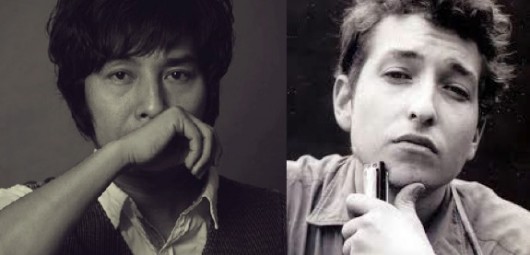This is part 2 of our look at Hong Qi, a Uyghur folksinger who grew up Han.
Hong Qi discovered Bob Dylan in 2001. That was the year he heard “The Answer Is Blowing in the Wind” for the first time. Speaking in an interview a decade later, he said he liked Dylan’s confidence — the feeling he evoked with his broken voice. Although Hong Qi says his English is “very bad,” the imagery in Dylan’s lyrics touched him deeply.
Over the past decade, he says he has become a Dylan fan. “I like all his songs, his fascination with all images. I respect his political stance. My songwriting is influenced by him.”
In short, Dylan has become Hong Qi’s idol. His intensity and productivity inspires him. Writing in a blog post in 2009, he mused: “His music is not that intense, which enables you to get the force of his appeal. His songs are rough, which helps you understand their warmth elliptically; he is protesting something, shouting something, which I can comprehend across languages. There is no way not to, because he is Bob Dylan.”
Over the years Hong Qi has been influenced by other artists as well. In the poetry chapbook that accompanied his 2008 album Where are you Alimjan?,Hong included poems he had written to the Chilean protest singers Violetta Parra and Victor Jara. In that album he brought the affect of these protest singers to bear on more indigenous sources of communist protest: everyday heroes of the Chinese revolution such as Lei Feng and the Uyghur poet Lutpulla Mutellip. Hong Qi is trying to conjure these spirits of the past in the present circumstances of Xinjiang.
In fact, some of the album critics think Hong Qi depended so much on these sources that the distinctiveness of his own voice was in danger of being obscured. Like Dylan’s critics, some labeled Hong Qi unoriginal because of his bricolage approach to songwriting and image-making — borrowing from sources that he finds active and vital.
Hong Qi’s more recent albums have effectively dismantled accusations of dependency and unoriginality. Not only is he positioning himself as a transnational link in a chain of folksingers across the world, he is also bearing witness to his own unique social position: a Red singer from Hotan.
In his 2014 album Heart of Darkness, Hong Qi dedicated a song to Bob Dylan and the legacy of protest and honesty that he sees him standing for. The song “I Want” is sung as an anthem with a group of folk singers from Xinjiang and across the nation: Erkin, Ma Tiao, Zhang Chu, Zhong Lifeng, and Yang Jiasong. In the interlude, the refrain of “The Answer Is Blowing in the Wind” emerges before it is subsumed once again by a march of desire through Ürümchi streets.
I Want
Ma Tiao:
I want to kiss the person who is not by my side ,
I want to sing a song that is not in my heart,
I want to plant a tree but I don’t have the soil,
I want to give my bones to the embrace of the ocean.
Erkin:
I want to go down a very smooth road,
I want to read a book has the weight of steel,
I want to open doors that have been closed
I want to cut directly through the silence of thought.
Together:
I think I want to wear winter clothes in the summer,
I think I want to hear the clear outlook of birds,
I think I would like to distinguish the weight of bodies
suddenly exposed on a sacred public square.
The song then repeats with Hong Qi and Zhang Chu singing the verses and then Yang Jiasong and Zhong Lifeng alternating through the stanzas.
In 2011 Hong Qi finally had the chance to see Bob Dylan in person. For Hong Qi, this experience was magical. He saw in Dylan a calm, commanding presence indifferent to the opposition of his audience; he was there to perform a task. “At the end of his work he walked away, leaving behind an era.”
This song, like so many of Hong Qi’s songs, invites us to move on with the story of our lives. It is a march of desire to live fully. This is exactly the march that fills the streets of Urumchi every day.
Beige Wind runs the website The Art of Life in Chinese Central Asia, which attempts to recognize and create dialogue around the ways minority people create a durable existence, and, in turn, how these voices from the margins implicate all of us in simultaneously distinctive and connected ways.


















































BTW, The Official name of the song is BLOWIN’ IN THE WIND.
Well I guess that the price you pay when you translate《答案在风中飘荡》back into the English… Thanks for reading jbelkin!